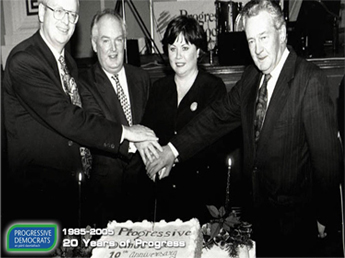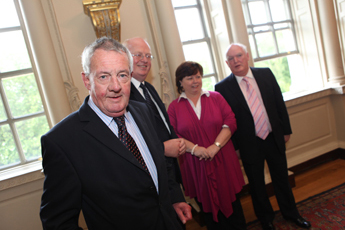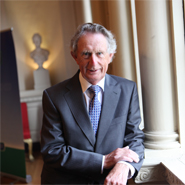Posted 11 June 2009
Progressive Democrats Party Papers placed in UCD Archives
Setting out to break the mould of Irish politics, and exercising a key influence over policy and politics in Irish public life, the Progressive Democrats had 23 years of an action-packed history, a full fourteen of which were spent at the heart of government, a unique record for a smaller Irish political party.
The party began with a whirlwind of election wins in 1985, but over the course of subsequent years lost and won seats again, always on a fine line between success and failure. While driving its economic and policy agenda, it grappled with government, party and leadership crises. It finally chose to wind itself up in late 2008, having fallen under what it considered a critical mass of TDs, when just two were returned to the Dáil in the general election 2007.
Pictured far-right: Bobby Molloy

Launching the PD Party in 1985: Michael McDowell, Paul Mackay, Mary Harney, Des O'Malley

PDs hand over archive to University College Dublin 2009 - Saying farewell, the four founders of the PDs
Handing over the collection to UCD, Minister for Health, Mary Harney said that the influence of the Progressive Democrats was evident in many ways. “We are seen as the party of low taxes, but we’ve been able to have an impact on many other areas. I believe we have had a very significant influence over the historic settlement of relations between all traditions on the island of Ireland and the ending of paramilitary violence and criminality. We have supported the liberalisation of social legislation. We have promoted open, fair competition in airlines, telecommunications, transport and other sectors. We have supported high standards of public accountability in areas like the Beef Tribunal and the Ansbacher Enquiry. We have had a significant role in reforming public services, ending self-regulation of professionals (e.g. doctors, pharmacists, accountants), improving cancer care, developing a comprehensive new way of supporting people in long term care with the Fair Deal, and putting standards and patient safety at the heart of health services.”
The Party, founded by Des O’Malley, Mary Harney, Michael McDowell and Paul Mackay in December 1985 was considered to be the most influential small party in the history of the State.
The first party to enter coalition with Fianna Fáil, the first party to elect a woman leader, the first small party to be re-elected to Government on two subsequent occasions, the Progressive Democrats were undoubtedly a force for change to the Irish political landscape for two decades.
In February 1985 Fianna Fáil opposition to Barry Desmond’s Family Planning Bill became the last straw for Des O’Malley. His Dáil speech, remembered as the “I stand by the Republic” address, challenged his own party colleagues. Mary Harney broke away from Fianna Fail to support the historic Anglo-Irish Agreement and the principle of consent. Michael McDowell left the Fine Gael party in Dublin South East. Bobby Molloy and Pearse Wyse left Fianna Fail to give the new party a major boost.
“The archives constitute a very significant body of material documenting all aspects of the Party’s activities throughout its existence. It is unique insofar as it documents comprehensively the complete lifecycle of a modern political party,” said Seamus Helferty, Principal Archivist at UCD Archives.
“Core records include Parliamentary Party minutes and National Executive minutes and reports as well as financial and membership records and correspondence. As one might expect from any modern organisation, a considerable percentage of records have been transferred in electronic format.
The collection includes 150 boxes of conventional textual documents supplemented by a wealth of audio-visual records. It is particularly rich in photographic and visual material from election campaigns and conferences. Cataloguing the papers will take two years, after which the majority of the collection will be available to researchers.”
“The decision of the Progressive Democrats to deposit their papers in UCD builds on the archives collection held by the university which includes the Fianna Fáil and Fine Gael parties’ papers.” said Professor Ronan Fanning, UCD’s Director of Archives Acquisitions; “it is a tribute to the reputation of UCD Archives as the most important repository for political papers in the State.
The influence of the Progressive Democrats started with their foundation in December 1985, but was crystallised with the historical coalition with Fianna Fáil in 1989 when Charles Haughey and Des O’Malley put aside their differences and formed a unique working relationship,. The price for office for Fianna Fáil was a government programme heavily influenced by Des O’Malley and the PDs covering taxation reform, economic and social policies, Northern Ireland and the environment. In return, the PDs supported the partnership programme that secured industrial peace and supported economic growth.
The later Governments headed by Bertie Ahern as Taoiseach with Mary Harney as Tánaiste resulted in two coalition governments sitting for two full Dail terms in sequence – a unique event in Irish politics.
Once catalogued, the UCD Archive records will reflect all the political issues in the life of the Progressive Democrats, the life of the Governments in which they participated, and the public life of the country.
Note on UCD Archives
UCD Archives specialises in the acquisition of private paper collections associated with the history and development of the modern Irish state. It preserves the papers of a great many Irish public figures including members of government and the judiciary, presidents and European Union Commissioners. These are complemented by the papers of members and former members of college staff, many of whom have served in high public office. UCD Archives also holds the records of significant organisations such as political parties, trades unions, professional and cultural associations and sporting bodies. These collections constitute an essential resource for research into twentieth century Irish history, politics and culture.

